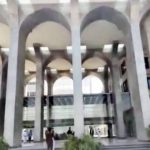 ISLAMABAD, Feb 17 (APP): Thirteen years on, the families of victims of Samjhauta Express mourn the tragedy when 68 persons onboard the Delhi-Lahore train were burnt alive including 40 Pakistani nationals on Feb 18, 2007.
ISLAMABAD, Feb 17 (APP): Thirteen years on, the families of victims of Samjhauta Express mourn the tragedy when 68 persons onboard the Delhi-Lahore train were burnt alive including 40 Pakistani nationals on Feb 18, 2007.
In the travesty of justice’, the Indian court in 2019 had acquitted all culprits of the incident despite the availability of ample evidence, illustrating the unwillingness of the Indian government to hold the perpetrators to account for their barbaric action.
The acquittal of the self-confessed mastermind of the attack, Swami Aseemanand and some other accused, reaffirm the culture of impunity that the perpetrators of terrorist attacks enjoy under the BJP-led and Hindutva-driven political dispensation in India.
In solidarity with the families of the victims, Pakistan has time to time reminded the Indian government of its responsibility to take serious and credible steps to bring the perpetrators of the Samjhauta Express blasts to justice.

A special National Investigation Agency (NIA) court in India’s Haryana state on March 20, 2019, acquitted four individuals accused in the Samjhauta Express bombing case. The ruling cited a lack of evidence for the acquittal of Swami Aseemanand, Kamal Chauhan, Rajinder Chaudhary, and Lokesh Sharma.
This was the second major setback for the NIA in a “terror” case allegedly involving Hindutva groups. In April 2018, the NIA court had acquitted all the 11 men charged in the Mecca Masjid blast case, where six people were killed in Hyderabad.
Astonishingly, Indian courts have failed in the provision of justice in almost all cases where ‘Hindutva Wave’ was involved in brutalizing Muslims whether it was Babari Masjid Case, Mecca Masjid Case, Malegaon Blast, and Samjhauta Express. Eight judges were changed during the proceedings of the case.
Vikash Narain Rai, former Haryana police officer who headed the Special Investigation Team (SIT) from 2007 to early 2010, had confirmed Indore as the epicenter, where RSS member Sunil Joshi and his two accomplices were found to be complicit in the crime. Joshi was murdered in 2007 before he could be interrogated. The prosecution had accused the NIA of pressure to ‘go soft on the Hindutva extremists.’
It was revealed later that the explosions were planned to take place in Delhi for more publicity and to involve Pakistan through arranged investigation, but it actually took place in Pani Pat, Haryana. So it became the Haryana case. Had it been a Delhi case, it would have received more publicity.

Kamal Chauhan, a RSS Sevak confessed during the investigation of planting the bombs on board the Samjhauta Express after undergoing training in arms and explosives in Haryana and Madhya Pradesh.
According to India’s National Investigation Agency (NIA), which probed the case, the attack was carried out by a Hindutva far-right group to avenge similar attacks allegedly carried out by Muslim groups with the aim of threatening the “unity and integrity” of India.
Swami Aseemanand, alias Naba Kumar Das, a former member of the Rashtriya Swayamsevak Sangh (RSS), was found as the mastermind in the conspiracy by NIA.
The Samjhauta Express bombing was part of a string of similar attacks in 2006 and 2007 where Muslims were targeted. The first incident occurred in Malegaon, Maharashtra state killing 40, second in Hyderabad city where 400-year-old Mecca Masjid was hit by a blast that killed six people while the third one targeted Ajmer Sahrif Dargah in Rajasthan killing three. The NIA found a similar pattern and materials used in all explosions.

Swami Aseemanand, who featured prominently in the course of the investigations, had said in a taped interview in 2014 to Indian magazine ‘The Caravan’ that some of the worst attacks in the country were sanctioned by the then-RSS top leadership.
Pakistan had termed the news of the acquittal as “highly condemnable. Indian high commissioner was summoned to Foreign Office to lodge Pakistan’s protest and condemnation against the acquittal of the four accused, including the main perpetrator Swami Aseemanand.
Pakistan believes that the systemic Indian decision to gradually exonerate and finally acquit the perpetrators is not just a reflection of India’s callousness towards the families of the deceased Pakistanis, but also reflective of the Indian state policy of promoting and protecting Hindu terrorists.







